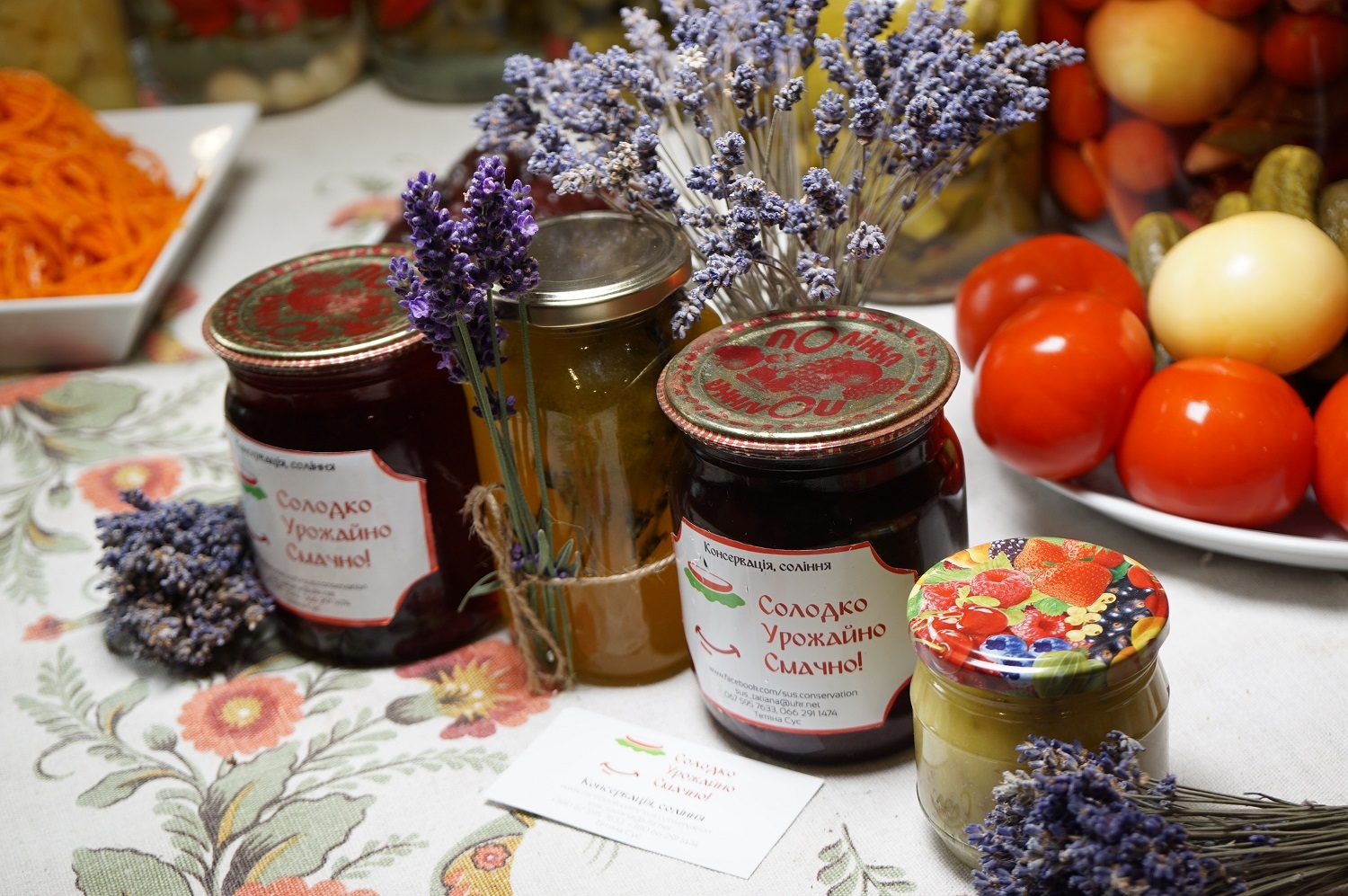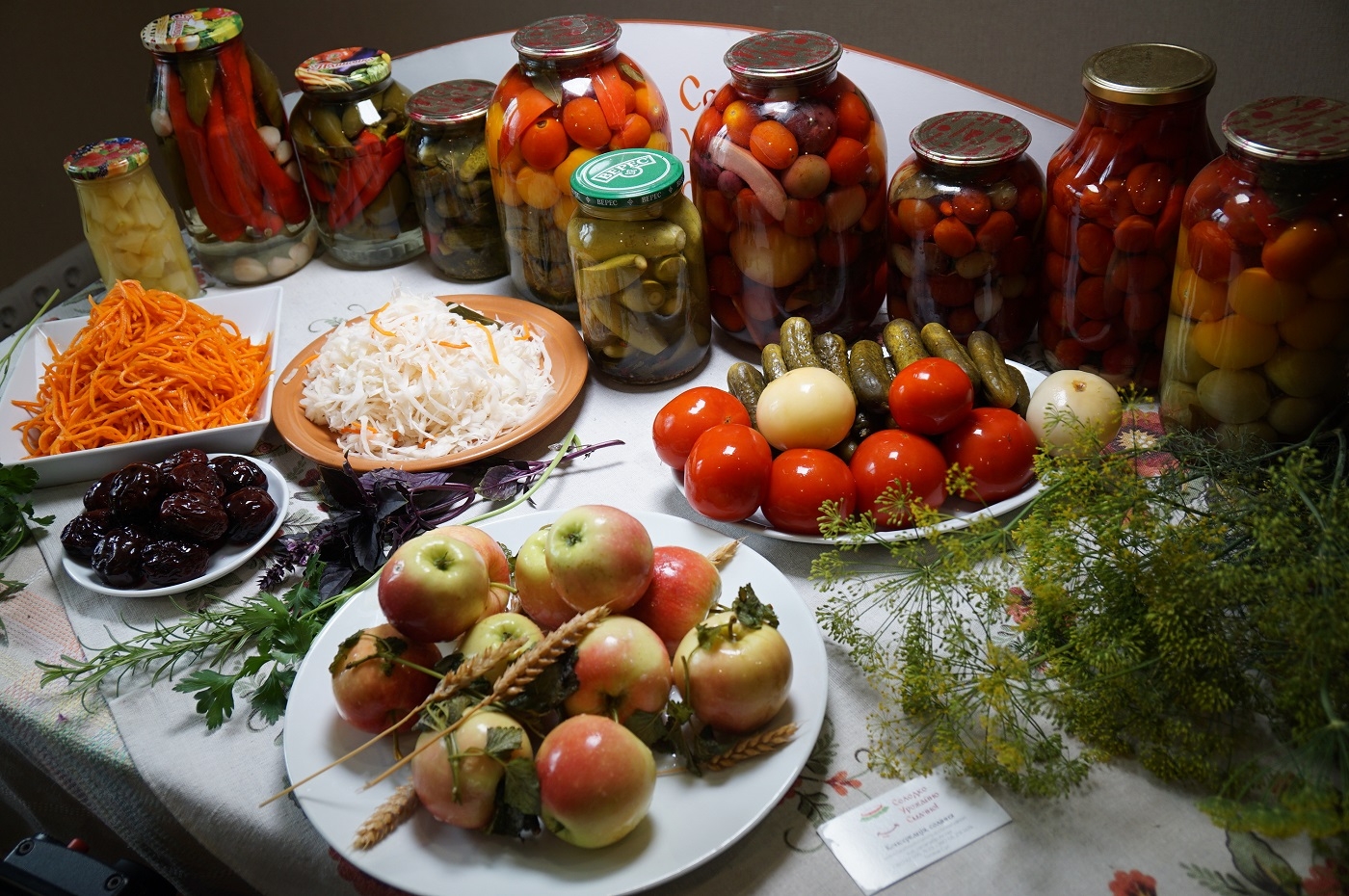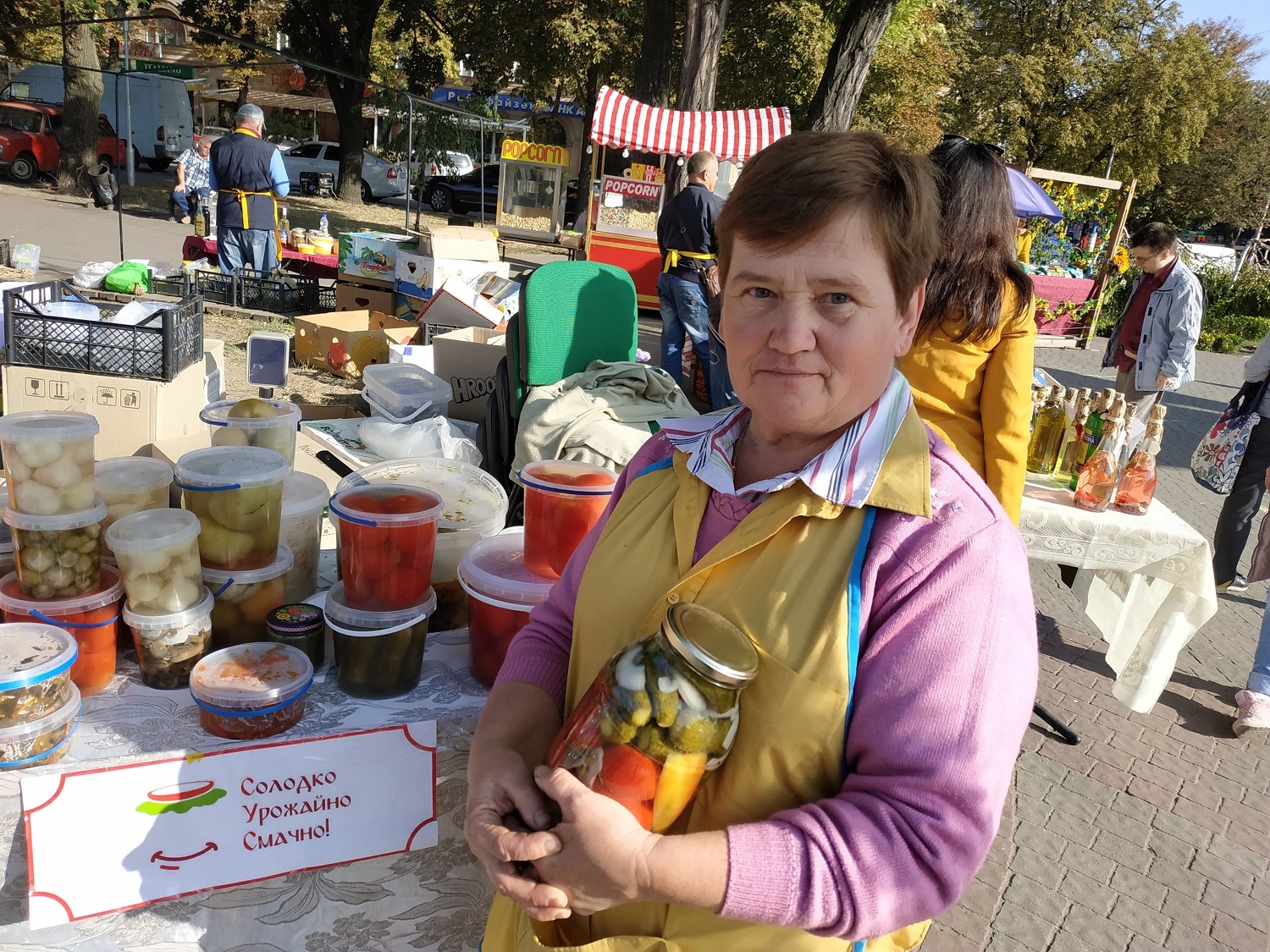From salted food to artichoke. Business diversification experience
How a small farmer from a small village managed to establish a steadily growing family business dealing with salted food production, launch sales in a trade network and create demand for new vegetables?
Tetiana Sus, entrepreneur and farmer from Matviivka village of Zaporizhzhia region, has professionally manufactured salted food for 20 years. Her products are known by aficionados, bought by restaurants and sold by networks. However, Sus family does not stop at what they have achieved and creates the market by starting growing and selling okra, lavender and artichokes. The entrepreneur described how they managed to do it at the Festival of canning in Zaporizhzhia, where she brought her products.
“In 90s we built a greenhouse, planted a field, sold vegetables and greenery. In autumn vegetables are very cheap in villages, it grieves us to throw them away, but it is not feasible to sell them. We tried to preserve cucumbers by salting and sell them at the marketplace in winter. Then we started producing salted tomatoes, sauerkraut, Korean carrot salad. Each year we expanded the range of products”, she recollects. Salted products were very tasty, we put our heart in them and the demand increased. In summer we sold fresh vegetables and produced semi-products, in winter we sold salted food at the marketplace.
Step by step the family planted 8 hectares with vegetables. Sus’s farm was one of the first to use drip irrigation on the field – as a result, the yields became higher. They were the first to switch to the use of the Dutch hybrids. However, each year Tetiana became more sure that it was easier and more profitable to preserve vegetables.
Own production facility
Sus family considered it unprofitable to lease places at the marketplace or stand and sell the products by themselves or hire sellers and decided to organize wholesale delivery to shops. “It was easy to launch sales in shops at that moment. We required minimum documentation for the products”, she runs back in time. Shops and local networks were eager to sell delicious salted food made by Sus family since customers purchased them actively.
In 2002, we purchased the building of former canteen in a neighboring village Liutserna and created a facility for vegetables processing. Here we equipped warehouses with fridges to provide the temperature required for marinading of vegetables and storing of final products. “Earlier we salted cucumbers and they were stored in the cellar. However, every year the winter becomes warmer and one cannot do without a fridge. The right temperature ensures the proper technological process. Products do not become too sour and there are no losses”, Tetiana Sus explains.

Processing is more profitable
“The margins of the canned products increases 7 times in comparison with fresh vegetables, - notes Tetiana. – Earlier it was enough to salt vegetables and deliver them to any shop for sale, whereas now we should pay attention to the documentation, agreements, product certification”. Still people sell any canned food, even home-made, in small shops or at the marketplace, but the majority of reputable shops and even medium networks require documents confirming the compliance of the food products with the security standards.
As the years passed, Sus family stepped away from farming and focused on vegetables processing. “We try no more to grow everything on our own and find farmers that grow products of the required quality, breed and then process such vegetables and sell by wholesale”, tells Viktoriia, Tetiana’s daughter who currently deals with sales.
4 tons of taste
The main assortment of Sus family is products sold by weight: several kinds of eggplants, 4 kinds of salted and fermented tomatoes, cucumbers, standard sauerkraut and sauerkraut with different spices, apples, horse-radish, cranberry, Korean carrot salad. During the season we sault watermelons, marinade garlic and plums. The entrepreneur outlines that firstly they expanded the range of products but later narrowed it down based on Pareto principle and left only the most profitable products. In terms of volume, most of all people purchase cheap sauerkraut and salted cucumbers.
Usually shops purchase 3-5, 10 kg- buckets. After the quarantine was imposed they started making small packages with the weight of 0,5-1 kg.
They mainly operate in Zaporizhzhia and sell salted food via the network Apelmon. Cooperation with the networks required expansion of production and it encouraged us to grow.
“We have an agreement on the supply with Varus network, but we haven’t worked with them yet since the volume of our products was not sufficient. Last year we purchased in Poland the line for chopping and fermentation of cabbage using the grant funds and now we can produce the required volume”, Viktoriia Sus describes their achievements.
They deliver products to shops in Zaporizhzhia and in the region twice a week and transfer two tons of goods during one delivery. It means that Ukrainians eat 4 tons of different salted products made by Sus family per week.
At the same time, pickled plums are purchased by the restaurants in Kyiv and we have standing orders for salted food from the cafes in Zaporizhzhia.

Family business
Currently Tetiana Sus is the head and manager of small family company. Her main responsibility is own production of salted food. Her daughter Viltoriia undertook business promotion and sales. Her father and brother-in-law deal with delivery to the shops (for this purpose they purchased a minibus) and help at the production facility.
“When preparation season starts in October we all deal with procurement and preparation of vegetables”, states Tetiana. “The season of salting ends in April. In total, 6 persons work at our production facility. Earlier we worked hard from the dusk till dawn, but now we want to automate everything as much as possible”.
The turnover increased after the purchase of the equipment for the cabbage chopping and the entrepreneur managed to save funds and purchase machine for chopping of carrot for Korean salad. We increased working efficiency and the products look better now.
Sweet, fruitful, delicious
Competitive advantages of products of Sus Private enterprise are the popularity with buyers gained during many years, taste and possible delivery of the required volume of goods.
“We have sold our products at the marketplaces, delivered salted food in shops for many years. Consumers love our products and distinguish them from others”, Tetiana says. “We do not use preservative agents, sugar substitute products, garlic or spices substitute products. Substitute products decrease the price of the products significantly, but the taste is absolutely different”.
Awareness is gained at the festivals, fairs where Sus Private enterprise presents not only standard products, but also the limited ones. For example, marinaded garlic, plums, fashionable sauces.
Apart from the improvement of the production technology and new equipment Viktoriia Sus improves sales and servicing, including by means of training, consulting related to the processes optimization, branding, marketing for farmers-women.

Okra, lavender, basil
Sus family also cares about the risks diversification. Apart from salted food production, they keep working with field and greenhouses but now they apply a creative approach. “We have always wanted to do something new: we grew broccoli, savoy and Chinese cabbage. We were the first to grow round eggplants and white onion. Last year we planted okra, just out of curiosity”, Viktoriia tells. “We did not know what to do with that okra at first. Then we took it to the festival and the buyers told us themselves what to do with okra and how to cook it.”
No one else grows okra in Zaporizhzhia region and in the whole Ukraine this crop is rather new, so we receive orders from different cities. Viktoriia claims that the demand for okra grows, since more and more people are interested in healthy eating and vegetarianism. A special target audience is students and employees from Thailand, Syria, Pakistan, India where okra is a part of their food culture. “This year we didn’t even advertise okra, since the demand was higher than our supply”, notes Viktoriia.
The lavender plantation drew additional attention to the farm of Sus family. It covers only one hectare, but the location is very popular with local Instagram bloggers. The residents of Zaporizhzhia also love buying lavender bouquets.
Last year we planted artichokes. We cut them and sold as flowers. “This crop is interesting, - says Tetiana, - But currently I view it rather as a floristics component than as an edible vegetable”.
Sus family definitely intends to develop and move forward. They are looking for the person who can sell their products in the Internet, perhaps by adding it to the assortment in their own shop. They plan to cooperate with other trade networks and operate in the neighboring regions. The residents of Kyiv would also enjoy salted food from Zaporizhzhia.
Tetiana Sus:
Cooperation with Raiffeisen Bank Aval:
“We opened an account with the bank long ago in 2004 for the salted food production business and cooperation with shops. Before that, we had the account of our farm with another bank. Currently, our family has two accounts in different banks. The servicing in Raiffeisen Bank Aval is very convenient. There is a branch in the district center Vilniansk, the staff is very friendly and helps to settle all accounting issues.
We use most of all credit funds on the card to replenish working capital. We often have to cover some expenses, for example, when we purchase vegetables before the start of the season or need to invest funds in the packaging and in the equipment maintenance. We received and repaid loans many times. We also use overdrafts.
Recently we took advantage of the opportunity to visit a business club. Earlier we thought that we were busy and had no time. Now we understand that learning and consultations are very useful for the business. We also came to the conclusion: the wider the circle of business acquaintances, the more people recognize you and the higher are the chances to enter the market and get some additional benefits”.















